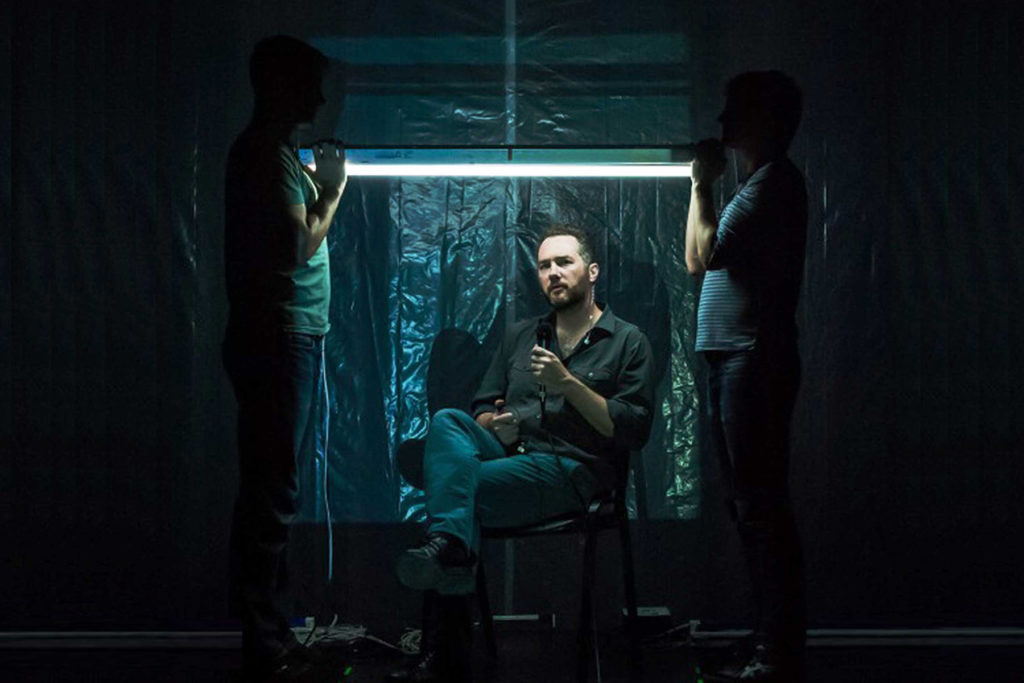Culture & Media
Rubén Polendo on “Juárez: A Documentary Mythology”
Beginning October 27, the Latino Theater Company will host a program by the New York-based experimental company, Theater Mitu, entitled Juárez: A Documentary Mythology. The piece is based on raw interviews of the residents of El Paso, Texas and Ciudad Juárez , Mexico, who tell what it’s like to live and work in a city with a reputation as the “murder capital of the world.”

Photo: Kayla Asbell, Theater Mitu
Beginning October 27, the Latino Theater Company will host a program by the New York-based experimental company, Theater Mitu, entitled Juárez: A Documentary Mythology. The piece is based on raw interviews of the residents of El Paso, Texas and Ciudad Juárez , Mexico, who tell what it’s like to live and work in a city with a reputation as the “murder capital of the world.”
The project is especially meaningful for Mitu founder and director Rubén Polendo, who grew up in Juárez but left to attend college in the United States. In his youth, Juárez was not the dangerous place it is today, Polendo says. It began to transform around 2000, when the drug trade shifted away from South America and was redirected through Mexico. By 2009, the city had earned its gruesome appellation; by 2010, at the peak of the violence, there were reportedly upward of 250 murders a month.
JUÁREZ: A Documentary Mythology Trailer from Theater Mitu on Vimeo.
When he revisited his hometown a few years back, Polendo felt like a foreigner, a stranger in the community he grew up in — yet at the same time he was deeply moved and unsettled by what his family and other people he knew were having to undergo. Imbued with the notion of documenting the experience of its citizens, he asked the members of his company to re-visit with him and, as “foreigners,” record conversations for this documentary work.
Polendo stresses that the main function of the piece (performed with an ensemble that includes many non-Latinos) is to stream the unfiltered feelings and sentiments of the multiple interviewees. The actors do not represent characters, nor is there an effort among the ensemble to reflect on or interpret Latino culture. The idea is to communicate the inner truth of their subjects’ lives, unvarnished. The actors haven’t memorized the dialogue but instead wear earpieces to relay verbatim the words from the interviews, transmitted to them from a tape.
As Mitu’s director and the formulator of its artistic tenets, Polendo often speaks about the significance of mythology in the creative process. By this, however, he is referring not to mythology as we commonly understand it — a collection of myths pertaining to a particular cultural tradition — but instead to a contemporary mythology, constructed of stories, he tells Capital & Main, “that people tell to define who they are…. an effort to make sense of their lives.”
Many of the interviewees are trapped in their circumstances. Polendo recalls as an example the experience of one woman whose husband was shot while driving their van; it was she who had to clean the blood from the seat, and to use the van the following day to ferry her children and do errands for her family. Like this woman, most people in Juárez have no choice but to carry on.
Not everyone, however, would choose to leave if they could. Polendo’s father, with deep roots in Juárez , is one of those, and believes that eventually change will come. The director tells this story of his dad: When he was a boy, the family’s house burned down, and one of the things he did, challenging the doubts of his brother, was to rebuild their piano from scratch so the family could continue to enjoy music.
As an artist of color, Polendo says it’s important not only to be able to tell stories, but to be able to tell them in a variety of ways. The process he and his company engage in — what Polendo terms Whole Theater — involves the creation of spectacle that is “rigorously visual, rigorously aural, rigorously intellectual, rigorously emotional and rigorously spiritual.”
First performed in 2014 after several years in development, Juárez is continually evolving, as the interview process moves on and new material is added. Meanwhile, the show is being performed in places like Cairo, Beirut and Abu Dhabi, with workshops and discussions encouraging people to connect what they’ve heard with events in their own lives. It’s hard not to perceive what’s happening in Juárez as reflecting what’s occurring all over the globe, and to give credence to something Polendo father’s said in his own interview “…the story of Juárez is the story of any city that’s been abused by progress.”
-

 Latest NewsApril 8, 2024
Latest NewsApril 8, 2024Report: Banks Should Set Stricter Climate Goals for Agriculture Clients
-

 Latest NewsApril 22, 2024
Latest NewsApril 22, 2024Oil Companies Must Set Aside More Money to Plug Wells, a New Rule Says. But It Won’t Be Enough.
-

 Striking BackMarch 25, 2024
Striking BackMarch 25, 2024Unionizing Planned Parenthood
-

 California UncoveredApril 9, 2024
California UncoveredApril 9, 2024700,000 Undocumented Californians Recently Became Eligible for Medi-Cal. Many May Be Afraid to Sign Up.
-

 Feet to the FireApril 22, 2024
Feet to the FireApril 22, 2024Regional U.S. Banks Sharply Expand Lending to Oil and Gas Projects
-

 Class WarMarch 26, 2024
Class WarMarch 26, 2024‘They Don’t Want to Teach Black History’
-

 Latest NewsApril 10, 2024
Latest NewsApril 10, 2024The Transatlantic Battle to Stop Methane Gas Exports From South Texas
-

 Latest NewsApril 23, 2024
Latest NewsApril 23, 2024A Whole-Person Approach to Combating Homelessness




















